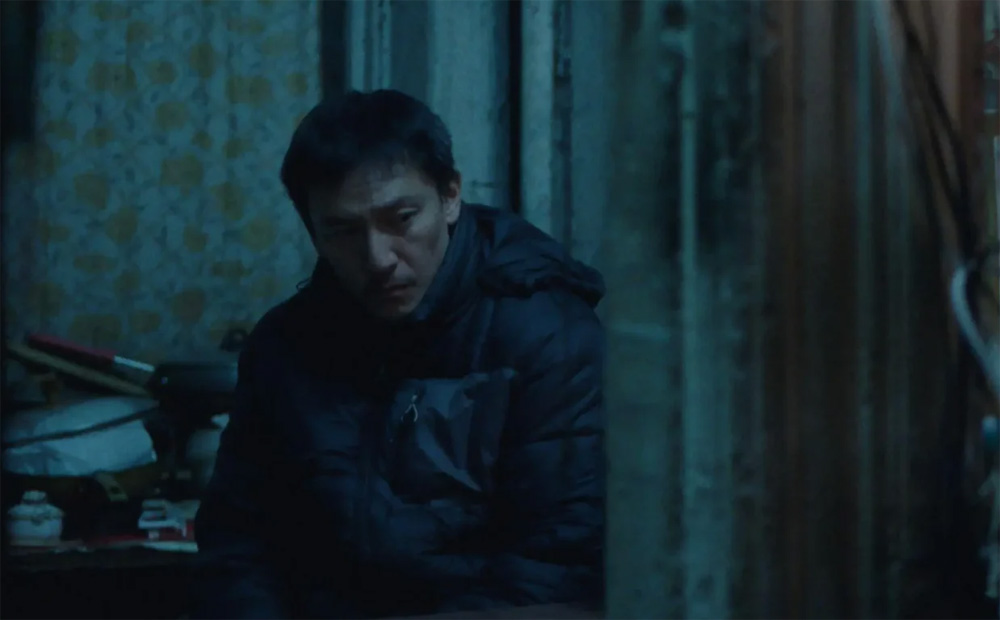Even the few that offer a moderately generous tip for their delivery man (Chang Chen) in “Lucky Lu” would hardly seem to appreciate all he has to go through for their convenience, barely acknowledging him as they spend mere seconds at their door while he hustles from one end of town to the other, balancing multiple bags from the handlebars of his bike, dodging traffic and scaling the steps of walk-up apartment buildings. It seems impossible that anyone could keep going like this, but Lu has no other choice, having put a down payment on a new apartment for his wife Si Yu (Fala Chen) and young daughter Yaya (Carabelle Manna Wei), who are coming in from China any minute and besides the roof over their heads, require a residence to facilitate their visas. They too won’t spend a second of their new lives in America seeing him sweat either, if he has his way.
Things work out far better in that regard for writer/director Lloyd Lee Choi in his remarkable debut feature than it does for his beleaguered protagonist when it’s staggering to think what was required to pull off the production set in the streets of New York with a metropolis’ worth of extras, if only the drama didn’t demand your attention at all times. Instead, Choi plunges audiences headlong into the precarious life Lu leads as the best 24 hours of his life are poised to turn into the worst as one calamity after another threatens his ability to keep the apartment he’s just leased as his family is ready to settle in and the most minor of bumps in the road could derail everything. While Choi was clearly inspired in part by “The Bicycle Thieves,” the Italian neorealist classic that many other filmmakers have pilfered from in recent years when the tale of someone whose livelihood is dependent on a bike seems more timely than ever in the age of DoorDash and Amazon — audiences at Cannes where “Lucky Lu” premiered were treated to a French spin on the tale just last year with “Soleymane’s Story” — the director has delivered something that it’s hard to compare to much else.
Although no sooner than the film starts does Lu’s bike get knicked as Lamberto Maggiorani’s once was, “Lucky Lu” doesn’t let a lack of wheels get in the way of racing all the way around the world that Lu is a part of, made up of immigrants all barely hanging on at nail salons, fish markets and restaurants where people are willing to do one another favors up to a point to stay afloat, having to protect what little they have as they sympathize with anyone that’s fallen on hard times. Lu is in a particularly deep hole when he won’t only go into debt because of the missing bike, but the super at his new building claims he was never paid after Lu handed over his money to a trusted broker and gives him a day to come up with both the first month’s rent and a security deposit just as his wife and daughter land in the States. Those that want to help him don’t have anywhere near a thousand dollars to spare and equally crushing as the thought his family will be sleeping on the streets is the idea he has nothing to offer as his employer (Perry Yung) has no use for him without the bike and trips to pawn shops yield no more than lunch money, a brutal reality check for someone who sacrificed seeing his daughter’s infancy in order to start a restaurant abroad that would give her a better future than he had.
Amongst cinematographer Norm Li’s generally exquisite compositions are a number of slivers of alleys, doorways and windows cracked open enough to see the other side but likely too narrow to get through, a feeling that follows Lu wherever he goes. While he momentarily brightens with the arrival of Si Yu and Yaya, having them around only becomes a part of the burden he has to bear when his daughter insists on spending time with him as he racks his brain for ways to make a fast buck and although he wouldn’t want her to see him this desperate, he really wouldn’t want her to see the kinds of things he may have to do to secure their rent. However, as far as partners-in-crime go, you couldn’t do better than the disarmingly feisty Wei as Yaya, who insists on being called “Queenie” — a nod to the lead character of Choi’s award-winning short “Closing Dynasty” (streaming on Netflix) — and never less than regal throughout when it’s clear she can look after herself.
It may be especially moving for cinephiles to see Chang Chen in the lead as the world-weary father after practically growing up on screen in the films of Wong Kar-Wai, Edward Yang and Hou Hsiao-Hsien, but that history isn’t necessary to feel he’s extraordinary as Lu, a man of unassailable dignity but questionable choices whose frailties are exposed well before his family notes that he’s far skinnier now than when they last saw him in China. When Lu is capable of terrible decisions — usually amongst a see of bad options, Chen makes him still impossible to dismiss and Choi ensures that there’s plenty of compassion to go around in a place where it seems like there’s none, perhaps the most impressive skill on display in a film where it feels like the weight of the world is on its lead’s shoulders with its level of immersion. There may be a bit of irony in the title “Lucky Lu,” but it’s sincerely breathtaking.
“Lucky Lu” will screen again at the Cannes Film Festival as part of Directors Fortnight on May 21st at 7 pm at the Alexandre III.




